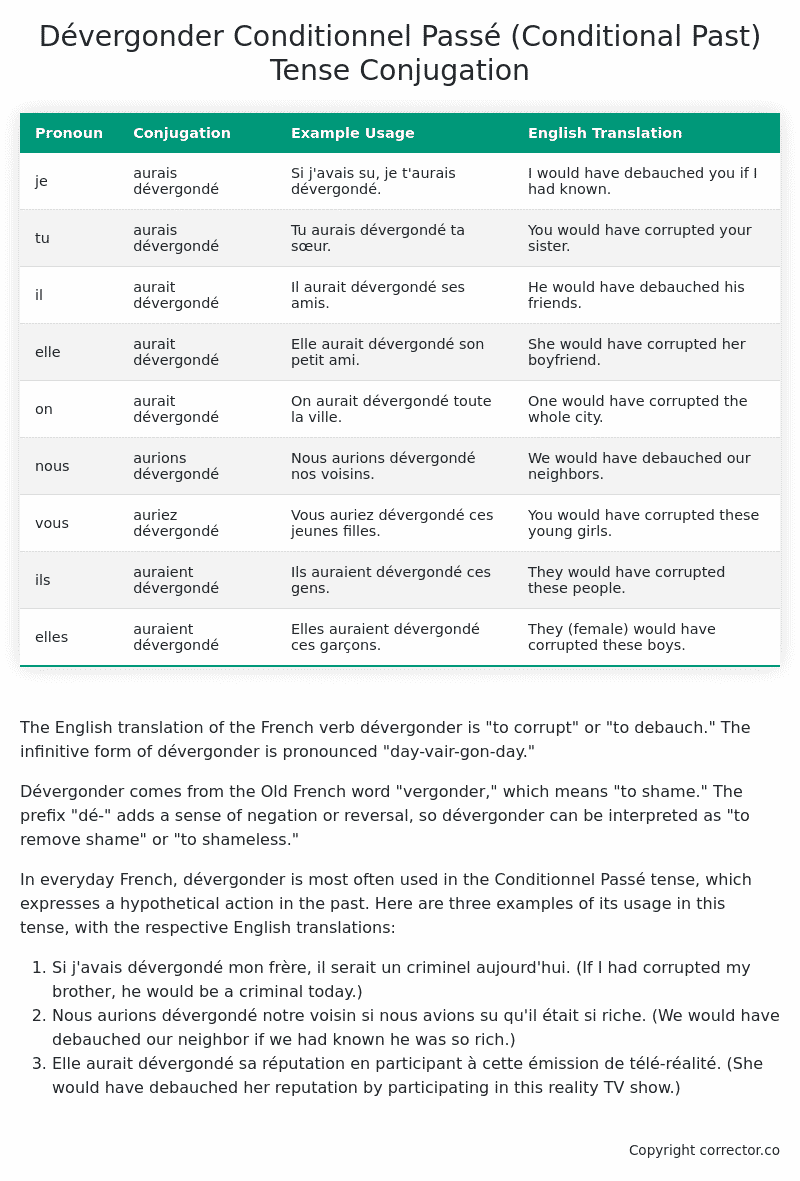Conditionnel Passé (Conditional Past) Tense Conjugation of the French Verb dévergonder
Introduction to the verb dévergonder
The English translation of the French verb dévergonder is “to corrupt” or “to debauch.” The infinitive form of dévergonder is pronounced “day-vair-gon-day.”
Dévergonder comes from the Old French word “vergonder,” which means “to shame.” The prefix “dé-” adds a sense of negation or reversal, so dévergonder can be interpreted as “to remove shame” or “to shameless.”
In everyday French, dévergonder is most often used in the Conditionnel Passé tense, which expresses a hypothetical action in the past. Here are three examples of its usage in this tense, with the respective English translations:
- Si j’avais dévergondé mon frère, il serait un criminel aujourd’hui. (If I had corrupted my brother, he would be a criminal today.)
- Nous aurions dévergondé notre voisin si nous avions su qu’il était si riche. (We would have debauched our neighbor if we had known he was so rich.)
- Elle aurait dévergondé sa réputation en participant à cette émission de télé-réalité. (She would have debauched her reputation by participating in this reality TV show.)
Table of the Conditionnel Passé (Conditional Past) Tense Conjugation of dévergonder
| Pronoun | Conjugation | Example Usage | English Translation |
|---|---|---|---|
| je | aurais dévergondé | Si j’avais su, je t’aurais dévergondé. | I would have debauched you if I had known. |
| tu | aurais dévergondé | Tu aurais dévergondé ta sœur. | You would have corrupted your sister. |
| il | aurait dévergondé | Il aurait dévergondé ses amis. | He would have debauched his friends. |
| elle | aurait dévergondé | Elle aurait dévergondé son petit ami. | She would have corrupted her boyfriend. |
| on | aurait dévergondé | On aurait dévergondé toute la ville. | One would have corrupted the whole city. |
| nous | aurions dévergondé | Nous aurions dévergondé nos voisins. | We would have debauched our neighbors. |
| vous | auriez dévergondé | Vous auriez dévergondé ces jeunes filles. | You would have corrupted these young girls. |
| ils | auraient dévergondé | Ils auraient dévergondé ces gens. | They would have corrupted these people. |
| elles | auraient dévergondé | Elles auraient dévergondé ces garçons. | They (female) would have corrupted these boys. |
Other Conjugations for Dévergonder.
Le Present (Present Tense) Conjugation of the French Verb dévergonder
Imparfait (Imperfect) Tense Conjugation of the French Verb dévergonder
Passé Simple (Simple Past) Tense Conjugation of the French Verb dévergonder
Passé Composé (Present Perfect) Tense Conjugation of the French Verb dévergonder
Futur Simple (Simple Future) Tense Conjugation of the French Verb dévergonder
Futur Proche (Near Future) Tense Conjugation of the French Verb dévergonder
Plus-que-parfait (Pluperfect) Tense Conjugation of the French Verb dévergonder
Passé Antérieur (Past Anterior) Tense Conjugation of the French Verb dévergonder
Futur Antérieur (Future Anterior) Tense Conjugation of the French Verb dévergonder
Subjonctif Présent (Subjunctive Present) Tense Conjugation of the French Verb dévergonder
Subjonctif Passé (Subjunctive Past) Tense Conjugation of the French Verb dévergonder
Subjonctif Imparfait (Subjunctive Imperfect) Tense Conjugation of the French Verb dévergonder
Conditionnel Présent (Conditional Present) Tense Conjugation of the French Verb dévergonder
Conditionnel Passé (Conditional Past) Tense Conjugation of the French Verb dévergonder (this article)
L’impératif Présent (Imperative Present) Tense Conjugation of the French Verb dévergonder
L’infinitif Présent (Infinitive Present) Tense Conjugation of the French Verb dévergonder
Struggling with French verbs or the language in general? Why not use our free French Grammar Checker – no registration required!
Get a FREE Download Study Sheet of this Conjugation 🔥
Simply right click the image below, click “save image” and get your free reference for the dévergonder Conditionnel Passé tense conjugation!

Dévergonder – About the French Conditionnel Passé (Conditional Past) Tense
Formation
Common Everyday Usage Patterns
Expressing Unreal Past Scenarios
Polite Requests or Suggestions
Expressing Doubt or Uncertainty
Interactions with Other Tenses
Conditional Present
Indicative Past Tenses
Conditional Future
Summary
Want More?
I hope you enjoyed this article on the verb dévergonder. Still in a learning mood? Check out another TOTALLY random French verb conjugation!


